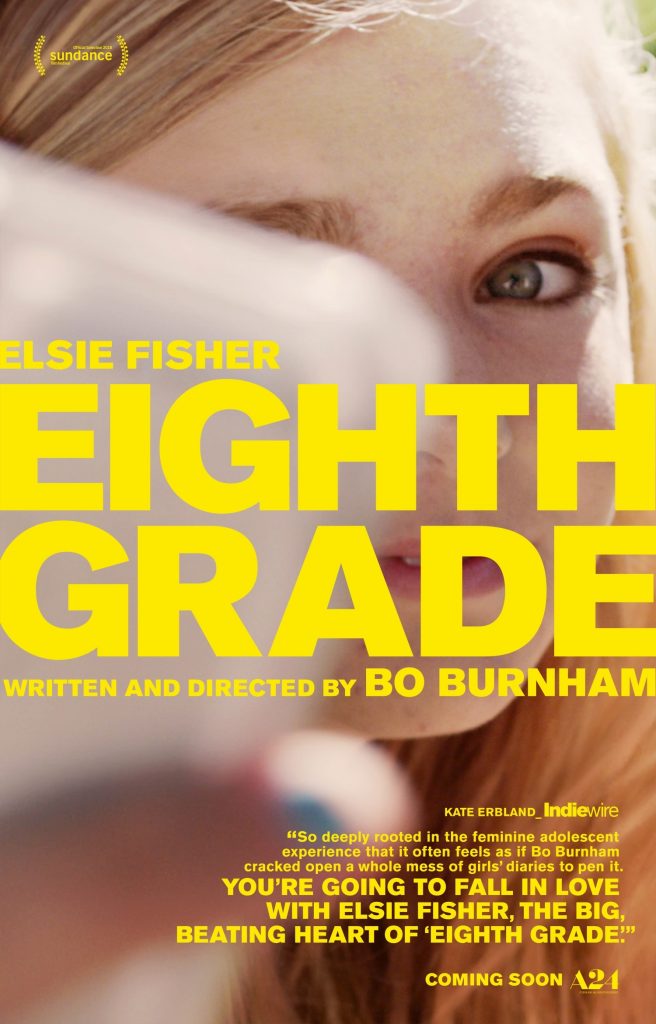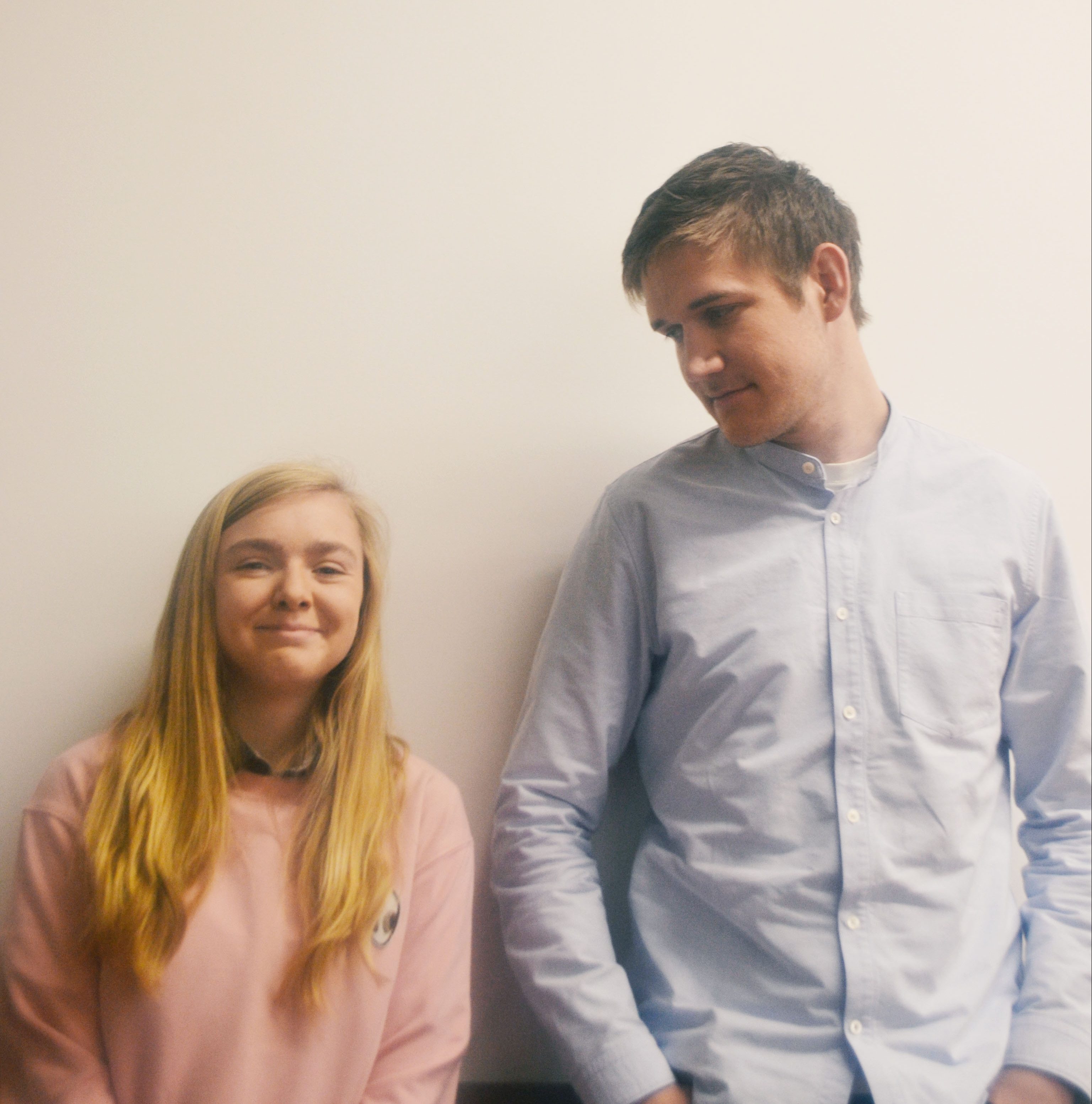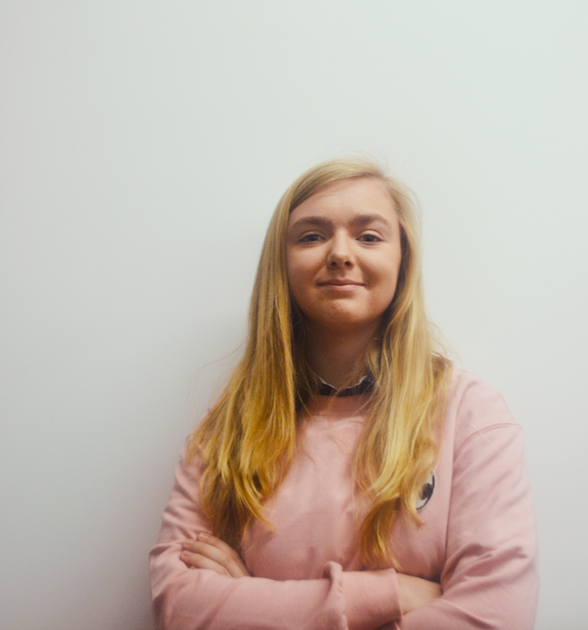Bo Burnham and Elsie Fisher tell us the about the making of ‘Eighth Grade’
by Rebecca Williams and Emma Dakin

Bo Burnham’s directorial debut “Eighth Grade,” starring Elsie Fisher as Kayla is one of the most natural and honest portrayals of modern day middle school. The movie follows a socially anxious Kayla as she wraps up the last few weeks of her middle school experience. She’s very much aware of her low social standing, caused by her inherent shyness. What Burnham does so well is create a believable modern middle school environment where characters are genuine.
Like many at the end of their eighth grade experience, Kayla is eager to quickly enter to high school and gain social acceptance. She meets an older high school boy who takes a quick liking to her and her friends. Later, however, Kayla encounters an uncomfortable and intimidating exchange with him — one that young women know all too well. This very experience allows Kayla to let go of her idealized version of high school and reevaluate some of her judgments, realizing that there aren’t strict deadlines to figuring out oneself and that even though she isn’t where she wants to be she knows she can get there one day.
The depiction of middle school is a fresh perspective from the myriad of cookie- cutter high school movies that follow the same tired template. Burnham challenges that template and instead decides to look at a very specific character and explore her idiosyncrasies and experiences. In Burnham’s specificity, there is also universality. Anyone, whether male or female, young or old can relate to the feeling of social anxiety. Throughout the film, the audience becomes invested in Kayla and roots for her to succeed. Another notable character is Kayla’s father, Mark, played by Josh Hamilton. Mark is a single parent who now has the seemingly impossible task of raising a teenage girl. A breakthrough moment of the film is when Mark explains to Kayla how proud she makes him feel and, despite his overprotective behaviors, he truly knows she will find her way through this adolescent chaos. It’s a touching moment that truly resonates with the audience who wished they’d heard that when they were 13.
Even though the movie only shows a few weeks of Kayla’s life, the audience is given room to invest and connect with her. Burnham, in his newest creative venture, has already succeeded in reviving the once deemed “saturated” field of school movies.
After the screening, The Connector sat down with Burnham and Fisher to discuss the film’s inspiration, production and career advice.
The Connector: Where did you find the inspiration to depict and portray 13-year-olds?
Burnham: The initial process was just watching videos of kids and transcribing word for word what they were saying, just to see if I could capture on the page what they were doing. I felt like when I watched real kids talk, I thought “If this was a real performance it would incredible.” It was the most layered and interesting thing I’ve seen. You see them start, then stop and think and self-evaluate all in the span of a second. I just tried to capture the sort of staccato way they speak, their stutter. For a while I transcribed it. It was feeling right and then I started writing my own. I just started writing as an original person talking about themselves. So that was the beginning, the beginning of the entire story was the way they talk, more than it was even a structure or a scene.
The Connector: How did the production all come together?
Burnham: I wrote the first draft a while ago in 2014. I wrote the script in two weeks, it was really really quick. I then sat with it for a while and updated it and then Facebook became less relevant and Snapchat became more relevant. The movie was greenlit probably seven or eight months before it got going and then there was immediate casting. The only thing that mattered was who this kid is.
Elsie Fisher: I got cast in April or May. February was the first audition.
Burnham: I never saw anyone more than once, but I texted her four or five times because I had to be sure. Then I tested her ability to act silently, to be angry or annoyed. That was the hardest part but she passed the test over and over again. She graduated eighth grade and then we started production and then a week after we wrapped. She’s in freshman year now.
The Connector: What was like for you Elsie, since this is your big break?
Fisher: Yeah it was really fun to do, that’s for sure. I was really glad I got to do this because the eighth grade isn’t really portrayed that much in movies. I just got done with [eighth grade] before we were filming and I really relate to Kayla on a deep level. have not related to a character more than that. It was really nice to be able to do that.
The Connector: As a creative, exploring a different avenue, was it challenging for you to step out of your comfort zone of comedy?
Burnham: It was definitely challenging. Mostly because I never felt comfortable in the comedy thing, truly. I feel more comfortable in this than I did there. I feel more naturally suited to do this. I like writing, making and conceiving things. The world of touring and getting up on stage every night was not natural for me.I like to try to go wherever ideas take me. It all feels sort of in the same world which is writing and trying to make the things I write. This to me feels like the thing I really want to do. Every day doing comedy felt like “What the f*ck am I doing?” This felt like “Oh boy, I really hope I could do this for a while.”
The Connector: What do you hope people take away from this movie?
Fisher: There are a lot of things that can be said. I think my favorite is to let people know that they aren’t alone in their experience, especially during this weird time. I thought I was and I thought no one else is feeling this way. Then I read the script and was like, oh everyone’s feeling this and I’m not crazy.
Burnham: Additionally, because I hope adults can see themselves in her too, I hope people realize this feeling is not your own, it’s shared and that’s a good thing. Also maybe for kids to see themselves culturally and feel recognized. Anyone who’s not thirteen can see what technology is doing, it’s scarier than you think and less scary than you think. Kids now are stronger, more resilient and more intelligent than you think. I don’t really want anyone to think anything, I don’t really care but I hope they feel. I hope they are feeling things, anything. I’d much have people leaving with their heart aching than leaving thinking it was a Ted Talk.

The Connector: Do you already have ideas of where her story is going?
Burnham: I don’t know, and that’s the point. The whole point is that I could never have seen right now coming three years ago. The whole point is just trying to capture whatever the moment is right at the moment.
The Connector: What is your advice to anyone trying to break into the industry?
Fisher: I have no advice. My entire career is probably based on luck or at least starting it. Also, I started when I was 5. I want to give advice but I can’t say anything.
Burnham: So much of my career was also based off of luck so I can’t really give total practical advice. I will say for this generation of young people making stuff, there’s a huge emphasis on branding and self-promotion. I deeply believe that the best brand or way to promote yourself is to make good work. And I see so many people pulling the cart way before the horse. They establish an audience but they have nothing to show for it. The great thing about the creative process is that the real meat of the creative process is available to everyone right away which is just actually doing the work. It is starting the process of making, writing, having the idea and refining yourself. Just start and enjoy it. You actually can be fulfilled by it right away. It’s not like you slug away, get successful and then it gets to be fun. The way in which it is fun for me is the same way in which it was fun when I had nothing. This is advice I tell myself all the time which is focusing on the work and do the work, it’s the only thing you have control over. The promotion should always be decorative and subordinate to doing the work and getting better by your own standards and hopefully also making rent, truly.































